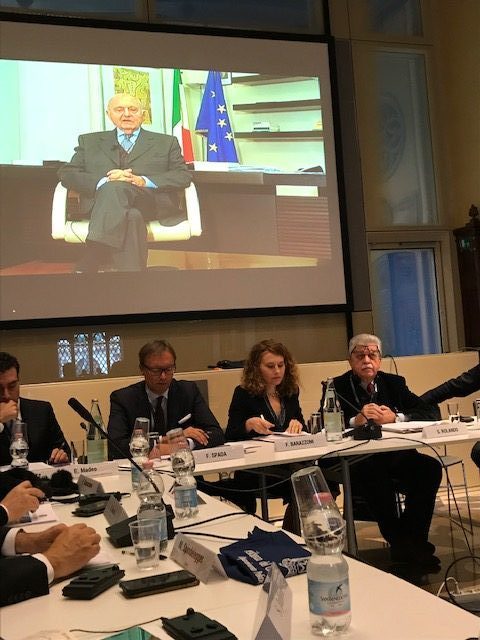11 December 2018
 The autumn session of the Club of Venice was held at Palazzo Franchetti on 22-23 November, a two-day work session involving eighty institutional operators and communicators, scholars and experts from all EU States, both members and candidates. It was the 100th meeting for the Club of Venice.
The autumn session of the Club of Venice was held at Palazzo Franchetti on 22-23 November, a two-day work session involving eighty institutional operators and communicators, scholars and experts from all EU States, both members and candidates. It was the 100th meeting for the Club of Venice.
The Club of Venice is in fact the informal body that brings together EU institutional communication managers to discuss common interest topics, compare information and communication strategies, and exchange ideas and experiences on best organisational practices. Italy's member is the Department for European Policies, nationally in charge of coordinating communications on EU policies and activities.
The event was introduced by a video message from Paolo Savona, Minister for European Affairs, and greetings from Eugenio Madeo, Deputy Secretary-General of the Presidency of the Council of Ministers, Fiorenza Barazzoni (Department for European Policies), Fabrizio Spada (European Parliament Information Office in Italy), Roberto Santaniello (European Commission Representation Office in Italy).
Stefano Rolando, President of the Club of Venice, gave an introductory speech.
The first session discussed how to re-establish trust between citizens and the EU, and focussed on the communication campaign in preparation for the 2019 European elections, which will be inter-institutional (without the logos of the different parties involved) and mainly aim at informing citizens of their electoral rights and urging them to vote. In the afternoon, capacity building, public service transformation and open government topics were discussed, reviewing the implementation of the Vilnius Charter of 8 June 2018 on “Shaping Professionalism in Communication”.
The second day involved a long panel moderated by Silvio Gonzato (Director of Strategic Communications, Parliamentary and General Affairs at the European External Action Service, headed by Federica Mogherini) and entirely dedicated to the topics of ‘hybrid threats' and cybersecurity, keeping the debate within the framework of traditional institutional communication topics.
The expression increasingly associated with fake news is “hybrid threats”. As well known, this expression has been in use for a few years and refers to changing and flexible situations that can be produced by institutional or private actors and require detection and counteraction. Nonetheless, “countering” means understanding that manipulations have their narrative and suggestive character and that dismantling must also take place on such ground.
Distinction must be made between misinformation (dissemination of false elements without ill intentions), disinformation (dissemination to cause harm), and malinformation (transferring to the public sphere what should remain in the private sphere).
As Stefano Rolando pointed out in his closing remarks, “A 'new world' is arising in the professional culture of this sector, which requires reflection and fine-tuning about training courses, the nature of supranational reporting tables, the points of distinction between the 'creative' scenario of traditional communication and the 'vocational' scenario of this new anti-manipulative or anti-pollution front that was once thought to be the prerogative of counter-espionage services.”
The latest issue of Convergences, the Club's online magazine, was also presented. It opens precisely with an in-depth look at the work of the Vilnius plenary in June 2018.
